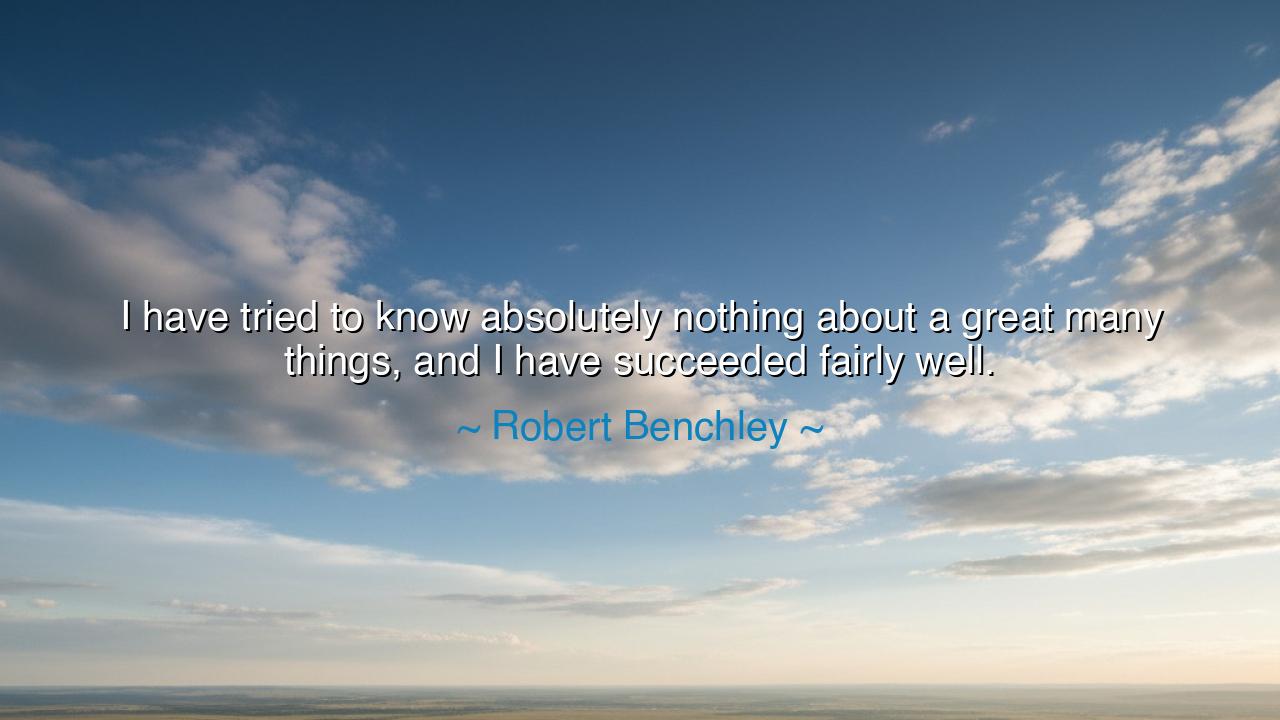
I have tried to know absolutely nothing about a great many
I have tried to know absolutely nothing about a great many things, and I have succeeded fairly well.






In the annals of wit and wisdom, there walks a man whose laughter was a lamp to the weary — Robert Benchley, master of irony and mirror of modern folly. From his lips flowed the jest that conceals a deeper truth: “I have tried to know absolutely nothing about a great many things, and I have succeeded fairly well.” At first, these words may seem no more than the idle humor of a gentleman amused by his own indifference. Yet beneath their shimmering laughter lies an age-old wisdom — the wisdom of restraint, of knowing one’s limits, and of guarding the mind from the flood of trivial noise that threatens to drown the soul.
In every age, mankind has been tempted by the illusion of omniscience. The ancient Greeks told of Icarus, who, seeking to fly higher than all others, soared too close to the sun and fell to his doom. So too does modern man, surrounded by information, opinions, and endless facts, rise on fragile wings of arrogance, thinking himself enlightened, when in truth he is blinded by excess light. Benchley, in his jest, speaks like a prophet wrapped in comedy: he declares that there is freedom — even nobility — in not knowing. To know too much of the unimportant is to forget the essential.
In the old days, the wise men of the East taught the art of emptiness — that the cup must be hollow to receive the water. So too does Benchley’s humor echo that ancient teaching. His “success” in knowing nothing is not a failure of intellect, but a triumph of clarity. For to choose ignorance of the meaningless is the first step toward understanding the meaningful. The fool rushes to fill his mind with every passing whisper; the wise man clears a space for silence, that truth may enter.
Consider the tale of Socrates, the philosopher who, when called the wisest of all men, replied, “I know that I know nothing.” His confession was not an admission of weakness, but a revelation of strength — for he alone among men understood the limits of his mind. In the same spirit, Benchley laughs at his own ignorance not to mock himself, but to mock the pride of a world that mistakes accumulation for wisdom. He sees the comedy of an age where men know everything about nothing — the names of distant stars, the gossip of strangers, the price of every coin — but little of kindness, humility, or peace.
This quote, then, is a mirror to our restless age. We are surrounded by knowledge without understanding, information without wisdom, connection without depth. Benchley’s “knowing nothing” becomes a rebellion — a quiet refusal to let one’s spirit be enslaved by the noise of the world. It is the art of mental simplicity, of selective ignorance, of choosing what to see and what to leave unseen. It is the laughter of a man who has found peace in limitation, where others drown in abundance.
Let us learn from this wit clothed in humor. Seek not to know all things, for that path leads only to confusion and pride. Instead, guard your curiosity as a garden, pruning it often, letting only the worthy thoughts take root. Be content not to have an opinion on every matter. Leave some mysteries untouched, some conversations unanswered, some debates unheard. In this restraint, your mind will find space to breathe, and in that space, wisdom will dwell.
Thus, O listener of time, remember this: to know everything is to understand nothing. Learn deeply, but not broadly without purpose. Choose your ignorance with care, as the sculptor chooses which stone to discard. Laugh, as Benchley did, at the futility of trying to master the world’s chaos — and instead, master yourself. For the one who can laugh at his own ignorance has already stepped closer to enlightenment.






AAdministratorAdministrator
Welcome, honored guests. Please leave a comment, we will respond soon